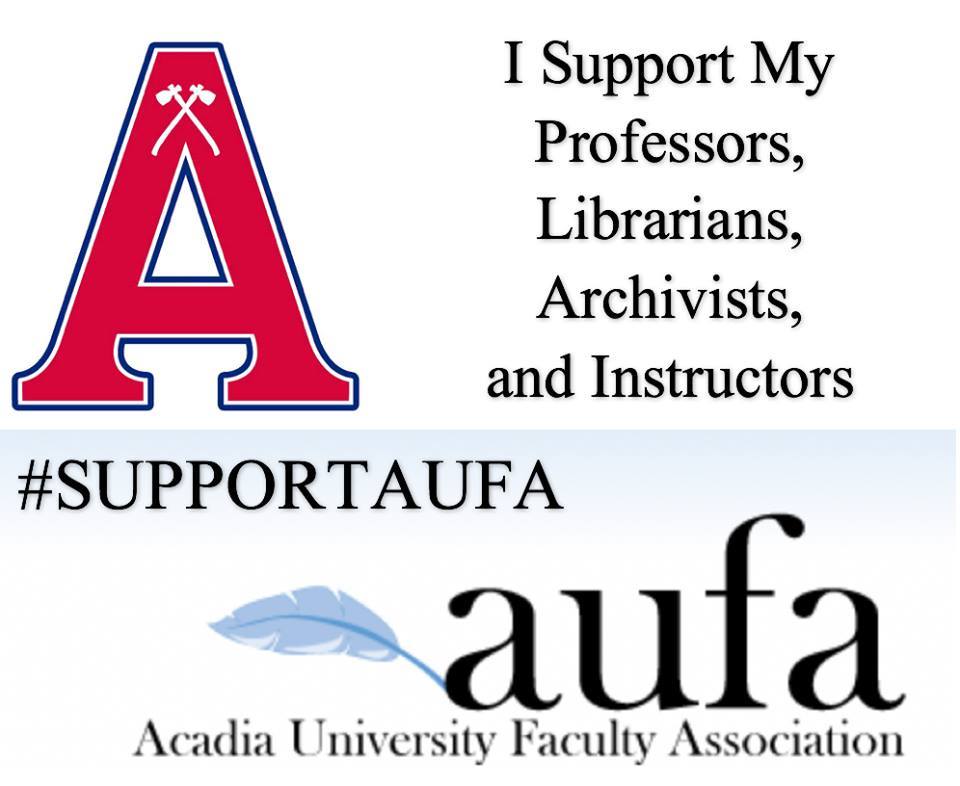With the impending strike just around the corner it is time for students to be as informed as possible. We sat down with the president of AUFA, Dr. Stephen Ahern, to hear the faculty union’s side of the negotiations first hand and to see how this new agreement could affect the students and university as a whole. Adding our own personal views is included to show that there are students who do support what the faculty is trying to accomplish. As students, it is important for us to stay informed and lend our support to our educators as they fight for rights that unions have won for decades.
Snippets from the Interview with Dr. Stephen Ahern:
Alex: Thank you for meeting with me today. My first question is kind of two questions in one: Why is this strike or job action necessary but also why doesn’t the union WANT to strike but have to?
Dr. Ahern: Well, a job action, a strike, should never be necessary. Faculty members work under a contract agreed to by both the board of governors (the administration at Acadia), and the faculty (the employees covered by that contract). We get together every few years, and we talk through what should be the rules and the operating procedures, and how are we going to help run the university? Faculty association collective agreements tend to be a lot more complex than in other workplaces because it’s actually part of our job to run the university. When it comes to ensuring that the broader resources of the institution are properly allocated, though, unfortunately that conversation doesn’t tend to go very well … as those in charge of the funding don’t really want to have to listen to priorities of the faculty who actually do the frontline work of teaching, of service, of research and scholarship.
My legal and moral obligation as an Executive member of AUFA is to make sure I follow through on the will of the majority (as AUFA is a democracy). We have a very mature, careful, and thorough process of consulting our members: we ask them in surveys and in meetings: what would you need in the next collective agreement to do your job better? Then, we develop proposals to take to the bargaining table. These are voted on and endorsed by our members. The current round of bargaining started in March. The first 3 months were quite productive, some of it was important, various fixes… But when it turned to the question of resources, as always happens, in my 18 years at Acadia, our employer didn’t want to hear about our priorities for making Acadia better. There’s a long history here; we’ve had a rough time as faculty. Two agreements ago, in 2010, we agreed to take shrinking wages below the cost of living in order to deal with the fact that the university was in massive debt. This debt, you should know, was caused by past mistakes of the Acadia administration – they built buildings and spent money they didn’t have, to the tune of $70 million, and then came to their employees, not just AUFA members, and said “You know, we are in terrible financial straits, so there are going to have to be some cuts.” We watched the number of tenure-track professor positions (this is called the “complement” number) go from 182 down to about 138 in a short number of years. That’s a big decline as a percentage, and we could feel it in our departments, as there were fewer professors to do the work. When we came to the bargaining table three years ago, we said “We have to start getting this up” – [they said] “no, not possible.” I’ll tell you we are now about at 150, and when we came last March and started bargaining, we said “you have to hire other people like us. We’re not pushing for us, personally, we’re not talking about our own wages — you have to hire other people so our students can be properly educated,” and also so that all the service work we do, all of the committees we sit on, can be properly carried out so that the university can be healthy. This time, the Board came to the bargaining table and said, “Compliment number? Here’s what we want: 0. No number at all.” What do you say to that?
Alex: So AUFA is ready to do whatever it takes?
Dr. Ahern: We are trying all sorts of things, we are trying to get the Board team back to the table so we can get this done. It’s going to take some days, and people may not sleep. But we’re not going to come and basically be stalled and our time wasted because we’ve already gone through that, after 4 months of stonewalling by the Board and three rounds of conciliation that went nowhere. We are ready to compromise, and have already made two major moves, but to no effect. It’s time for the Board to get their head in the game and come ready to compromise before its too late. We understand that for current students this is a difficult situation as they are caught in the middle. And that is terribly unfortunate but we firmly believe it’s the Board’s fault. And we are getting lots of support from students and alumni. I would always hope for that, and am so impressed by it but understand that that takes a lot to see the long view.
Alex: So you talked about what the union is fighting for, and how and if it will benefit the students.
Dr. Ahern: One of the things we are fighting for is a childcare facility on campus [for staff and students, too]. Acadia is one of only a few universities in all of Canada that still does not have a childcare facility. The Board of Governors should be ashamed of that fact, and looking for ways to start fundraising. But they are refusing even that. We as faculty look around and say “how can we make this a better place at which to work and for students to come spend four years and thrive?”…
Alex: What can students do to support the faculty before, during, and after the impending strike?
Dr. Ahern: I guess the main thing is to make your opinions clear to the board of governors and the president of the university. That’s all that matters. Whatever your opinion is, make it clear. Put pressure on. Let us know your opinion…. That, really, often is a way to have an incredible impact on these last hours. It really can tip the balance, because then they’ll realize “Oh, we’re not just in a room bargaining with a few people. There’s a whole community out there that wants the university to properly support the front line academic work that professors, instructors, librarians, and others do every day.”
Alex: Is there any other information you’d like to relay to the students of Acadia?
Dr. Ahern: We have given official notice to the Minister of Labour of our intent to launch a legal strike on Monday morning. We can always stop that process, but it’s not going to be stopped until we have something in writing that’s legally binding because, frankly, past experience has shown that you can’t trust anything that’s not in writing.
Alex: Thank you so much for taking the time to meet with me this morning, this is all very important information beneficial to students.
The union is not just fighting for higher paychecks they think they deserve. They are bargaining for more full-time staff and to keep class sizes small, for us. Full time staff have the ability to be available for office hours and to dedicate more time to their students, opposed to part-time staff who may teach at many other institutions and have to travel from Halifax or their homes each day to teach their one class and then return. It is a benefit to the students to have more fulltime staff. WE SUPPORT our professors in their fight to gain rights that other universities have. WE SUPPORT their fight to make sure that we have the best education possible. Our educators do not want a strike, but need to stand in solidarity with their union and stand up for their rights.
As fellow students, we know that it sucks that the job action is interrupting our classes right now. But if these negotiations go through and these crucial needs are met, then it will benefit students and faculty for years to come and make Acadia a better institution and give students a high-class education.
To show support for the AUFA, share this article on social media with the hashtag #supportAUFA





